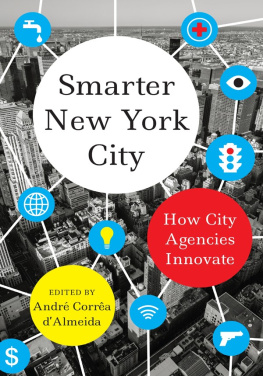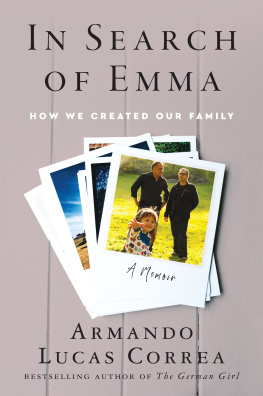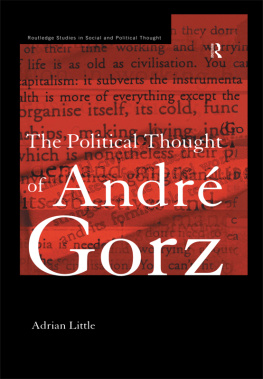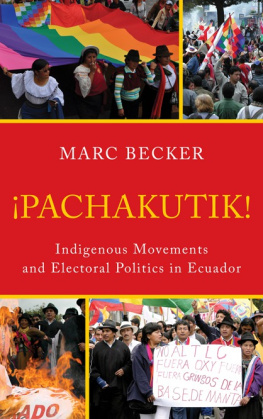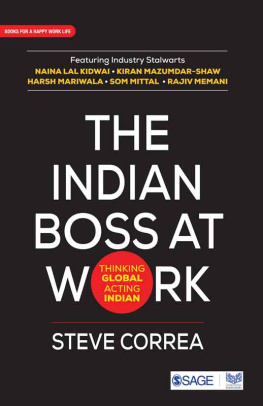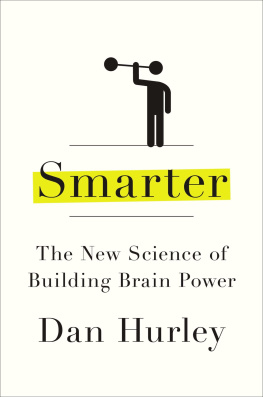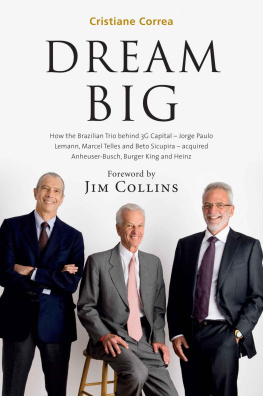Columbia University Press
Publishers Since 1893
New York Chichester, West Sussex
cup.columbia.edu
Copyright 2018 Columbia University Press
All rights reserved
E-ISBN 978-0-231-54511-2
Library of Congress Cataloging-in-Publication Data
Names: Corra dAlmeida, Andr editor.
Title: Smarter New York City : how city agencies innovate / edited by Andr Corra dAlmeida.
Description: New York : Columbia University Press, [2018] | Includes bibliographical references and index.
Identifiers: LCCN 2018003484 (print) | LCCN 2018005726 (ebook) | ISBN 9780231545112 (ebook) | ISBN 9780231183741 (cloth: alk. paper) | ISBN 9780231183758 (pbk.: alk. paper)
Subjects: LCSH: Municipal governmentTechnological innovationsNew York (State)New York. | Public administrationTechnological innovationsNew York (State)New York. | Administrative agenciesTechnological innovationsNew York (State)New York. | New York (N.Y.)Politics and government21st century.
Classification: LCC JS1234.A1 (ebook) | LCC JS1234.A1 S73 2018 (print) | DDC 352.3/67216097471dc23
LC record available at https://lccn.loc.gov/2018003484
A Columbia University Press E-book.
CUP would be pleased to hear about your reading experience with this e-book at .
Cover design: Catherine Casalino
Cover photograph: Francois Roux/Alamy
CONTENTS
ANDR CORRA DALMEIDA
JESSICA ESPEY AND NILDA MESA WITH SANDRA M. RUCKSTUHL AND MIHIR PRAKASH
CRAIG CAMPBELL AND STEPHEN GOLDSMITH
MAREN MAIER, MARY MCBRIDE, AND PAUL MCCONNELL
ANDREW YOUNG AND STEFAAN VERHULST
ANDR CORRA DALMEIDA AND CHRISTOPHER LEWIS
BERNICE ROSENZWEIG AND BALAZS FEKETE
ANA ISABEL BAPTISTA
MEGAN HORTON AND JOSEPH ROSS
CONSTANTINE E. KONTOKOSTA, JEFF MERRITT, AND SANDER DOLDER
TAMI LIN AND MAGORZATA REJNIAK
ARNAUD SAHUGUET
LAWRENCE LENNON AND GERARD SOFFIAN
ANDR CORRA DALMEIDA AND KENDAL STEWART
JERRY MACARTHUR HULTIN
STEPHEN K. BENJAMIN, mayor of Columbia, SC, and president of the U.S. Conference of Mayors
A s a student of cities, Ive watched Columbia, South Carolina, develop over the last three decades into an incredible microcosm of global society. Citizens from two hundred countries who speak ninety different languages, all engaged in the natural process of building a community, call Columbia home.
I have had an opportunity to serve on numerous boards for nonprofit organizations such as Columbia Urban League, Benedict College, and the Greater Columbia Chamber of Commerce among others, and I have realized that directing our efforts toward serving our communities is a building block of city development.
The city has always been regarded as an almost living, breathing organism that has responded to natural developments, societal innovation, and industrial shifts over centuries. The city as a society develops and changes over timeit is not a perfectly carved rectangular box drawn by cartographers negotiating political disputes, nor is it gerrymandered for political purposes by rival factions every decade or so. Cities are alive, and they must become smarter to survive.
In the study of the development of our society, it is important to recognize two consequential truths. The first truth is that development is never just a goal; it is also a continuous process, one in which a fully developed society is paradoxical and impossible in nature. The second truth is that the fuel need to break the status quo and move toward a more developed state is innovation.
Ironically, innovation is commonly perceived as simply the creative process of discovering something that was previously unknown, and as hinging on breakthroughs in technology and science. However, viewed more accurately, innovation is a broader concept that includes not only new findings but also new processes that drive us to those findings to discover better results, products, and services.
Cities will prosper not only through smart technologies but also through smarter ways of integrating that technology into existing functional systems. This book shows us how to expand the responsibility and role of technology and innovation in smart cities through case studies from some of the brightest minds in this field.
Imagine these concepts of development and innovation not as abstract ideas but as integral details of our everyday lives. The past decade has brought unprecedented changes in the ways we live our daily lives and in the ways we aspire to shape our future. Technological shifts are accelerating, and their reach is deepening in our societies. Some of these changes are visible and easy to recognize, such as a dramatic shift in the way we shop. Others are not so visible but equally present. For instance, congestion pricing as a traffic-management tool changes the preferences of commuters. This change isnt self-prompted; nevertheless, it impacts commuter behavior steadily and surely. Amazon has changed the way that much of the world shops, and the advent of the tech and app-enabled sharing economy has upended the taxicab livery business and disrupted the hospitality industry in most major cities.
It is impossible to miss that over the past few years, cities have swiftly taken center stage in discussions of sustainable development by becoming independent centers of power, position, progress, and thought leadership. Cities have overcome traditional institutional hierarchies of local, state, and federal government to address issues previously believed to be priorities of higher levels of government. In order to understand the heightened role of cities in urban sustainable development and their ongoing transformation from at times disorganized urban sprawls to structured smart cities, we must acknowledge the following.
Cities as Public Favorites
The United Nations projects that by 2050, about 70% of the worlds population will live in urban areas: by 2020, half of Asia will inhabit urban areas and by 2035, the urbanization rate in Africa will reach 50%the fastest ever in the shortest time period. Cities offer economic opportunities, upward mobility, entrepreneurial climates, and scope for innovation and growth. They are burgeoning not only in size and population but also in what they have to offer. Interestingly, 60% of urban land is not developed yet, which opens infinite possibilities for infrastructure developers and impact investors. In that sense, the futurequite literallyis the cities. Rural to urban migration is growing exponentially and cities, for all the right reasons, are becoming the public favorites.
Cities as Networks
Global directives (such as Sustainable Development Goals, Agenda 2030, and the New Urban Agenda) inform better practices and efforts with clear goals and objectives. While these directives are rather generic and global in scale, there are countless initiatives, conferences, and events targeted toward development of cities and innumerous avenues to discuss the specific challenges that cities face, as well as their potential solutions. Participants range from business leaders to academics, from political leaders to artists. The importance of multistakeholder collaboration is fundamental to and a backbone of sustainable development. Mayors are fostering efforts to bring coherence to bottom-up and top-down approaches by increasing public engagement in decision-making processes. These global collaborations are allowing cities to operate as networks.



